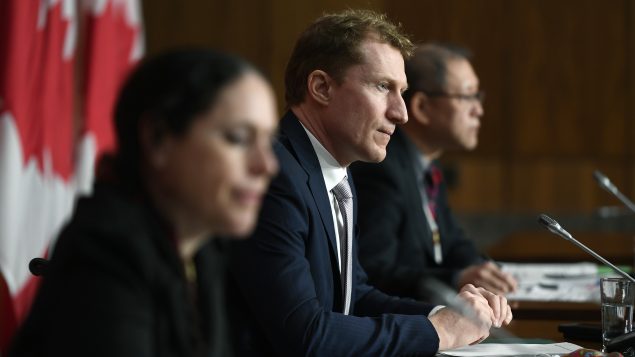COVID-19 infections continue to decline in Indigenous communities across Canada even as the federal government is bracing for outbreaks of more contageous variants of concern, Indigenous Services Marc Miller said Wednesday.
Speaking at a media briefing in Ottawa, Miller said there are now 1,443 cases of COVID-19 in Indigenous communities across Canada. Since the beginning of the pandemic last year, there have been 20,347 confirmed COVID-19 infections among the country’s Indigenous population, resulting in 220 deaths.
The federal government has had to deploy the Canadian military to several First Nations communities, including to Cross Lake in Manitoba where there are more than 200 active cases, to assist communities in creating more isolation spaces, helping with the public health awareness campaign and supporting frontline health workers, Miller said.
There are a total of 40 confirmed positive cases in Nunavik, in northern Quebec, and all but eight have recovered, Miller said. As of Feb. 23, the Arctic territory of Nunavut is reporting 33 active cases in the Kivalliq Region, and a total of 351 confirmed cases of COVID-19 since the beginning of the pandemic, the minister said. Of the 351 reported cases, 317 people have recovered from the virus.
As of Feb. 23, 2021, more than 103,000 COVID-19 vaccine doses have been administered in more than 449 First Nations, Inuit and territorial communities. The vaccination rate in Indigenous communities is six times higher than the rest of Canada, Miller said.
“Along with vaccinating Indigenous communities, we’re also supporting vaccine rollout in cities and towns across Canada,” Miller said.
Urban Indigenous populations face many of the same systemic barriers to accessing healthcare as those living in remote and isolated communities or on reserves, Miller said.
The National Advisory Committee on Immunization has recommended that all Indigenous adults be a top priority group for vaccination in the second phase of the vaccination campaign, Miller said.
“This is because the Indigenous population is more vulnerable to the effects of the virus due to the unequal access to healthcare and socioeconomic factors,” Miller said. “Provinces and territories must continue to engage with Indigenous partners and leadership while we continue the vaccination campaign.”
Dr. Tom Wong, Chief Medical Officer of Public Health, said while the overall decline in the number of infections is an encouraging sign, public health officials remain concerned about the spread of COVID-19 variants among the Indigenous population.
“Currently no cases of COVID-19 variants of concern have been detected within First Nations on reserve,” Wong said. “But it is just a matter of time, it’s not if, but it’s when.”
The variants first identified in the United Kingdom (B.1.1.7), South Africa (B.1.351), and Brazil (P.1) are already in Canada, according to federal public health officials. As of Feb. 23, all provinces have reported detections of variants of concern, with over 827 U.K. variants, 40 South African variants and one Brazil variant, said Wednesday Chief Public Health Officer of Canada, Dr. Theresa Tam.
Preliminary evidence demonstrates that the U.K. variant is associated with increased risk of transmission and disease severity, officials said.
Since the start of the pandemic, there have been 852,269 cases of COVID-19, including 21,762 deaths reported in Canada, Tam said.







For reasons beyond our control, and for an undetermined period of time, our comment section is now closed. However, our social networks remain open to your contributions.